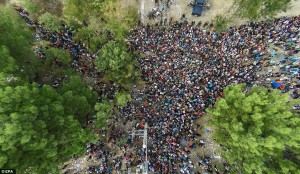If we’re to tackle a problem as serious and extensive as the mass migration into Europe, then we need to understand how and why so many attempts to tackle problems of this magnitude seem to have gone awry in the past.
We need to see the manner in which we normally approach problems like this and then discuss a new way.
We looked earlier at our unconscious and unexamined structure of beliefs and saw that we come from the assumptions that resources are scarce, suffering is inevitable, resources are scarce and, anyways, why should we do the work?
I’d like to take the process of examining how our minds work in this area a step further and look at the positions we take based on these assumptions.
When we were examining vasanas in past years, you recall that we said that, following the recording of the vasana, we reached a conclusion about the matter and then a decision. The decision was usually of the form “I’ll never do that again” or “I’ll always respond this way in similar future situations.” (1)
In his booklet Ending Starvation, Werner Erhard calls the decisions that we make “positions.”
He looked at the positions that people and groups take on the problem of global starvation and found them to include:
(1) Distributing food better
(2) Seeing starvation as nature’s way of population control
(3) Giving away excess food
(4) Letting the government solve the problem
(5) Getting industry to do it
(6) Getting churches to do it.
Any position we took, he found, calls up its opposite in equal measure.
If we said, “Let the churches do it,” it called up the opposite position of “Don’t leave it to the churches.” The government, the army, the churches – the same.
We can see this as a function of the way the mind operates in a dualistic dimension like the Third. Our minds think in terms of polar opposites or extremes and so a “yes” calls up a “no.” Positions call up opposition.
If we increase the strength of our “yes,” the other “side” (because we think in terms of sides) will increase the strength of their “no.”
So the moment that we take a position on the solution of the misery brought about by a mass migration, that position will call up its opposite.
And what happens to the effort involved is that, instead of addressing the problem, we become mired in arguments between the two sides. The media, which thrives on controversy, happily explores the why’s and wherefore’s of our differences. But the problem doesn’t get resolved.
Instead we find ourselves in a fog thicker than pea soup. Says Werner of it: “The pea soup is a mass of confusion, controversy, argument, conflict, and opinions. It is, in fact, composed of positions and oppositions.” (2)
Never mind addressing and resolving the problem; we cannot even see it for the confusion and controversy which are generated around it. That controversy is generated not only by people who actively oppose it but also by people who cannot in the first place understand the nature of the problem being faced.
What many of us do in this circumstance is provide ourselves with an out by making a gesture. We donate $20 to Doctors without Borders or sign a petition and that’s the end of it. Nothing conclusive, no adequate response to the situation results from this way of being.
When we realize the extent of the opposition that we face in making a difference, we can be plunged further into despair. As this generation has uniquely seen, our donations to such things as the Presidents’ Fund to aid the victims of Haiti’s earthquake or Hurricane Katrina were stolen by the very figures who should reside at the pinnacle of our trust. (3) If our leaders are that corrupt, what hope is there for us? we ask ourselves.
(Continued tomorrow in Part 2.)
Footnotes
(1) See for instance “Watching How Vasanas are Formed,” at https://goldenageofgaia.com/2013/01/02/watching-how-our-vasanas-are-formed/.
Werner Erhard, The End of Starvation: Creating an Idea Whose Time Has Come. San Francisco: The Hunger Project, 1977.
(2) Suzy Ward: With so much money donated for the reconstruction of Haiti after the earthquake a year ago, why is that country still a disaster zone?
Matthew Ward: Because those funds were stolen by the Illuminati after their technology caused the quake – that stealth is why former US presidents Clinton and Bush rushed to Haiti so quickly after the quake. (Matthew’s Message, Jan. 15, 2011.)


